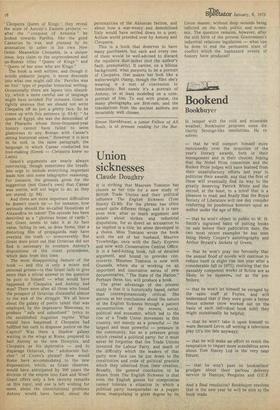Union sicknesses
Claude Doughty
It is striking that Maureen Tomison has chosen as her title for a new study of British Trade Unions and their political influence The English Sickness (Tom Stacey £2.80). For the phrase has often meant quite different things, and it is rare even now, after so much argument and debate about strikes and industrial disputation, for so direct an accusation to be implied in a title, let alone developed in a thesis. Miss Tomison wrote the book with the aid of her husband, Maurice Trowbridge, once with the Daily Express and now with Conservative Central Office. It is a hard-hitting book, full of detailed argument, and bound to provoke controversy. Maureen Tomison is now with Granada, where she is working on an important and innovative series of new documentaries, "The State of the Nation." Perhaps these, too, will produce a book.
The great advantage of the present study is that it is historically based, rather than contemporaneously critical. She arrives at her conclusions about the nature of the English Sickness through a patient reconstruction of the events, social, political and economic, which led to the rise of a Trade Union movement in this country, not merely as a powerful — the largest and most powerful — pressure in the community, but as a pressure group which created a political party: for it must never be forgotten that the Trade Unions invented the Labour Party, and much of the difficulty which the leaders of that party now face can be put down to the constitution and code of political practice which they inherited from their creators. Broadly, the general conclusion to be drawn from The English Sickness is that even the English genius for compromise cannot tolerate a situation in which a political party masquerades as a puppet show, manipulated in great degree by its Union master, without deep wounds being inflicted on the body politic and economic. The question remains, however, after the still birth of the present Government's industrial relations legislation — what can be done to end the permanent state of conflict which the haphazard events of history have produced?

































 Previous page
Previous page